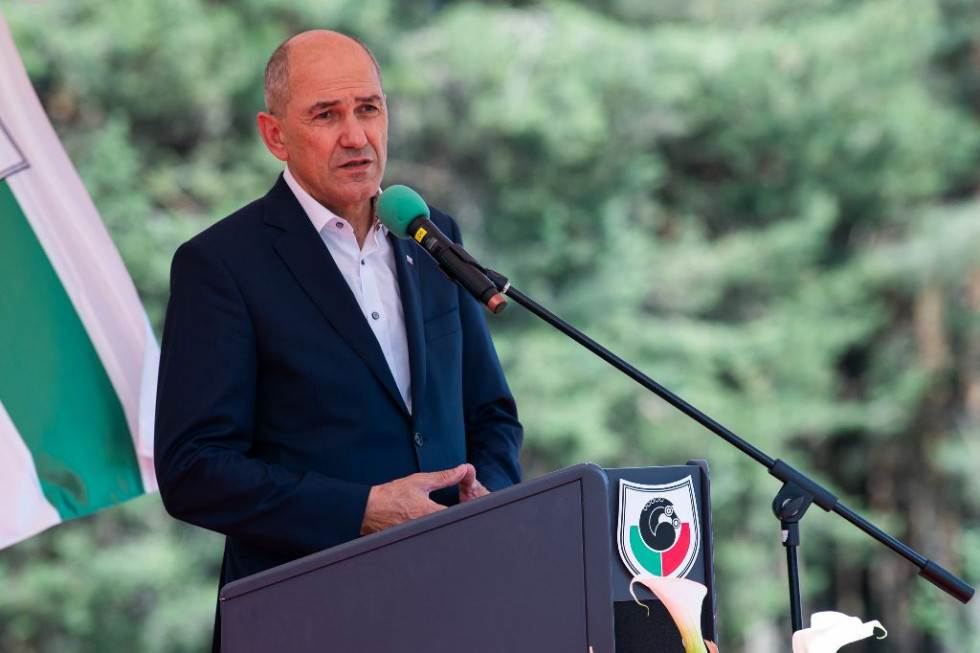Prime Minister Janez Janša attends the main celebrations of Grosuplje's municipal holiday
- Former Prime Minister Janez Janša (2020 - 2022)

Prime Minister Janez Janša at the main celebrations of Grosuplje's municipal holiday | Author KPV
Prime Minister Janez Janša today attended the official celebrations to mark the municipal holiday of Grosuplje and the Statehood Day, at which he was also the main speaker. In his address, the Prime Minister spoke about the events of 30 years ago, the road travelled and the situation today, which – despite some missed opportunities – should fill us with joy. The event took place at Kucelj, the highest peak of the Municipality of Grosuplje.
The Prime Minister said that on 25 June we will celebrate the day of all days. "On this day 30 years ago, Slovenians realised their dreams. And a few days later, in the war for Slovenia, we defended them." He went on to point out that there have been many challenges in Slovenian history, that many Slovenian ancestors died with their homeland in the forefront of their mind, but that no historical period has achieved the final act that Slovenians succeeded in 30 years ago. "The period of Slovenian independence is longer than those days in June and July when we declared and defended our independent state. It was a period of several years packed with events, at a time that brought change to Europe. That time of change also made it possible, to a large extent, to take the decisive step that transformed Slovenians from being a people into being a nation with their own state, becoming the masters of their own land."
The Prime Minister went on to stress that Slovenians had taken steps towards independence at the right time and in a manner that meant the price paid was relatively low, especially when compared to what would happen later in the in the other countries of the former Yugoslavia.
"As Slovenians we have just one occasion for which we can say we issued our own judgement, and that is the Slovenian plebiscite on independence. We have empirical proof that we were united at that time, and the result of that plebiscite is magnificent and incomparable to how other countries were formed." The Prime Minister considers that time to be a sacred time, a time that did not divide us, regardless of our political or other beliefs, and one that we remember with joy. It is also a time from which we draw strength and courage to take difficult decisions.
In his view, the time 30 years ago is incomparable to today. He pointed out that we were alone then. That, with a few exceptions at the beginning, Slovenia was not recognised by anyone. Slovenia was surrounded by four neighbours: Croatia, which was in a similar situation, and three others that did not regard Slovenia as an equal. At that time, war was in the air. Today, Slovenia is surrounded by countries that are all members of the European Union and NATO, Slovenian security is incomparably greater than it was 30 years ago, and the opportunities for development are far, far greater. Slovenia has problems, untapped opportunities, and yet, in retrospect, the situation is incomparable. Despite the epidemic, Slovenia currently has one of the highest economic growth rates in the European Union, and the number of unemployed is lower than before the crisis. "We have big plans for the future, so we can look ahead confidently to the next 30 years."
At the end of his speech, the Prime Minister expressed his joy that a few years ago the road leading to Grosuplje was named after Dr Jože Pučnik, a key visionary of the Slovenian state. Dr Pučnik was aware that the voice of the people in the plebiscite was so strong that no one would be able to prevent the decision being put into practice, which he expressed in the thought: "Yugoslavia is gone, now it’s about Slovenia."

